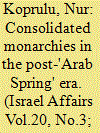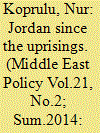| Srl | Item |
| 1 |
ID:
178537


|
|
|
|
|
| Summary/Abstract |
2019 marked the 25th anniversary of normalizing Jordanian-Israeli relations and the ‘warm’ peace-making between the two countries. Representing key partners and neighbours in the Middle East, Jordan and Israel have maintained political and economic ties since 1994. The pro-Western stance of both countries, and their common interest in maintaining regional stability, led Jordan and Israel to pursue similar foreign policy aims regarding various regional upheavals, as well as the Palestine-Israeli dispute. Jordanian-Israeli relations have, however, been caught amidst shifts in the US’s Middle East Policy under the Trump administration, which has raised questions over the status of Jerusalem and the West Bank. With respect to these developments, this article argues that the disaccord between the US/Israel and Jordan over these two places reveals that a politics of identity remains a pillar of the Kingdom’s stability and survival. Although both countries are being confronted with the same regional challenges, particularly in the wake of the war in Syria, the re-emergence of the rhetoric of ‘Jordan is Palestine’ – which poses the country as an alternative homeland for Palestinians (al-watan al-badil) – nowadays constitutes the top security concern for the Hashemite monarchy, and has the potential to undermine Jordanian-Israeli relations going forward.
|
|
|
|
|
|
|
|
|
|
|
|
|
|
|
|
| 2 |
ID:
133709


|
|
|
|
|
| Summary/Abstract |
The Arab monarchies remain relatively stable, largely unaffected by the 'Arab Spring' upheavals. In particular, the Hashemite Kingdom of Jordan has emerged relatively unscathed from the region's uprisings. The Jordanian case helps underscore the extent to which the polarization between Palestinian-Jordanians and native Jordanians continues to dominate the nature of public debate and political reform. While initially the 'Arab Spring' generated a spirit of cooperation between these two communities with calls to tackle unemployment culminating in demands for democratization, the persisting schism between them resurfaced when public debates on electoral law commenced. This article analyses the roots and ramifications of the 'Arab Spring' in Jordan, as well as the resilience of the kingdom to the nascent social upheavals.
|
|
|
|
|
|
|
|
|
|
|
|
|
|
|
|
| 3 |
ID:
133628


|
|
|
|
|
| Publication |
2014.
|
| Summary/Abstract |
The Islamist movement - in particular the Muslim Brotherhood - has begun to be seen as one of the main beneficiaries of the uprisings in the post-2011 Middle East. The Islamist group's support for public rallies (especially in Egypt, Tunisia and Syria) epitomizes a new era of challenge for the incumbent Arab regimes. Although it is too early to speak of structural change or a revolutionary era in the region, the events of the Arab Spring have highlighted the profound effect the Muslim Brotherhood Society (Jamaat al-Ikhwan al Muslimin) is having in most Middle Eastern countries.
|
|
|
|
|
|
|
|
|
|
|
|
|
|
|
|